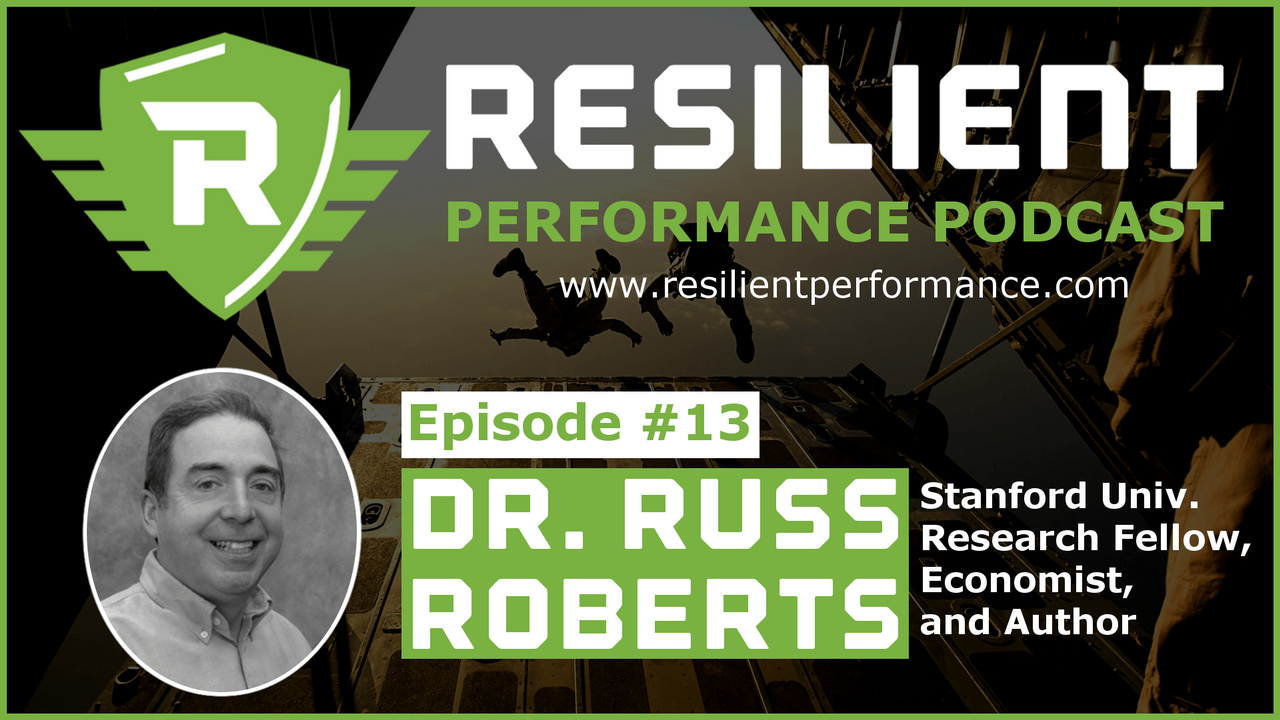
Dr. Russ Roberts on the Resilient Performance Podcast
Dr. Russ Roberts is the John and Jean De Nault Research Fellow at Stanford University's Hoover Institution. Roberts hosts the weekly podcast EconTalk--hour-long conversations with authors, and thought leaders in economics and beyond. Past guests include Milton Friedman, Thomas Piketty, Nassim Taleb, Michael Lewis, Christopher Hitchens and Marc Andreessen. Over 570 episodes are available at EconTalk.org and on iTunes at no charge. His latest project is "It's a Wonderful Loaf," an animated poem about emergent order and markets. His two rap videos on the ideas of John Maynard Keynes and F.A. Hayek, created with filmmaker John Papola, have had more than nine million views on YouTube, been subtitled in eleven languages, and are used in high school and college classrooms around the world. His latest book is How Adam Smith Can Change Your Life: An Unexpected Guide to Human Nature and Happiness (Portfolio/Penguin 2014). It takes the lessons from Adam Smith's little-known masterpiece, The Theory of Moral Sentiments and applies them to modern life. He is also the author of three economic novels teaching economic lessons and ideas through fiction. The Price of Everything: A Parable of Possibility and Prosperity (Princeton University Press, 2008) tells the story of wealth creation and the unseen forces around us creating and sustaining economic opportunity. The Invisible Heart: An Economic Romance (MIT Press, 2002) looks at corporate responsibility and a wide array of policy issues including anti-poverty programs, consumer protection, and the morality of the marketplace. His first book, The Choice: A Fable of Free Trade and Protectionism (Prentice Hall, 3rd edition, 2006) is on international trade policy and the human consequences of international trade. It was named one of the top ten books of 1994 by Business Week and one of the best books of 1994 by the Financial Times.
Topics Covered Include:
- The impetus for writing “What Do Economists Actually Know”
- Can we study economic policies in a way that controls for contextual factors or “noise”? Does the quantitative nature of economics trick us into thinking a particular policy is more concrete than it actually is?
- How difficult is it for voters to assess a political candidate’s economic aptitude when all we get during debates are soundbites? Even if a policy does “work”, is it likely to produce a tangible benefit during said candidate’s term?
- How important are humility and embracing uncertainty when assessing complex systems like the economy? How to find meaning in one's work in while being intellectually honest and skeptical.
- The relationship between specialization and prosperity. Where does economics end and things like history, political science, and even biology begin? When is overspecialization costly?
- Authenticity, the disconnect between reputation and reality, and the toxicity of self-deception. Hijacking virtue as a means of stifling discussion. The importance of nuance.
Links of Interest:
Freebies and exclusive promos!
We won't share your info. Unsubscribe at any time.

